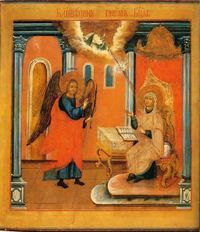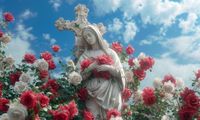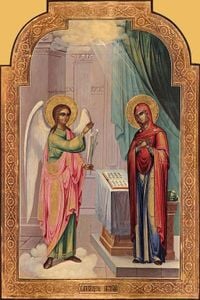On April 7, 2025, Orthodox Christians around the globe will celebrate the Annunciation of the Most Holy Theotokos, one of the most significant events in Christianity that marks the moment when the Virgin Mary learned of her divine mission to become the Mother of the Savior. This twelfth holiday, celebrated exactly nine months before the Nativity of Christ, holds a special place in the hearts of believers and is observed with various traditions and rituals.
The Annunciation, or "The Annunciation of the Most Holy Lady of our Theotokos, and the Ever-Virgin Mary," is a day rooted deeply in the Gospel narrative. According to the teachings of the Church, the Archangel Gabriel appeared to Mary, bringing the good news of her impending motherhood of Jesus Christ. This moment not only signifies the beginning of the life story of Jesus but also represents a pivotal point in the history of salvation—a first glimmer of hope following the expulsion of Adam and Eve from paradise.
As St. Gregory Palama articulated, the Incarnation was made possible through the free consent of the Mother of God, emphasizing the duality of divine will and human freedom. On this day, believers reflect on Mary’s unwavering faith and trust in God, as she accepted the angel’s message with humility, saying, "Behold, the servant of the Lord; may it be to Me according to your word." This response encapsulates the essence of faith—an unshakeable trust that transcends understanding.
The Annunciation is not only a religious observance but also a time for communal reflection and celebration. Traditionally, the day begins with a festive divine service, where clergy don blue vestments, symbolizing the significance of the occasion. While many Orthodox Christians strive to attend church services, those unable to do so are encouraged to light candles and engage in prayer at home.
One cherished tradition associated with the Annunciation is the release of birds, particularly pigeons, into the sky. This practice harks back to ancient customs where people would purchase birds to set free, believing that their flight would carry prayers to heaven. This act symbolizes freedom and hope, resonating with the message of the holiday.
Despite the ongoing Great Lent, which continues until April 19, the Annunciation allows for certain festive meals, particularly fish dishes. Families often prepare special buns called "larks" to share with neighbors and those in need, embodying the spirit of generosity and community that the holiday promotes.
Folk traditions and weather omens also play a significant role in the celebration of the Annunciation. Many believe that the weather on this day can predict the conditions for Easter. For instance, if the day is sunny, it is said that summer will bring storms, while snow on the Annunciation is thought to foreshadow a poor harvest year. Such beliefs highlight the connection between faith and the natural world, as people have long observed the interplay of divine providence and earthly cycles.
However, the Annunciation is also marked by a set of prohibitions that reflect its solemnity. Traditionally, it is advised not to engage in household chores, avoid consuming meat and dairy products, and refrain from activities such as cutting hair or planting. These restrictions serve to remind believers to focus on the spiritual significance of the day rather than mundane concerns.
In addition to the Annunciation, April 7 also coincides with several other observances. It marks the beginning of the sixth week of Great Lent, leading up to Palm Sunday, and is the feast day of various saints, including St. George, St. Rufin the Deacon, and St. Aquilina. These saints are honored for their faith and sacrifices, adding another layer of meaning to the day.
Moreover, April 7 is recognized internationally as World Health Day, established to raise awareness of global health issues. This observance, initiated by the World Health Organization in 1948, encourages individuals and communities to focus on health and wellness, underscoring the importance of caring for both physical and spiritual well-being.
As the world prepares to celebrate the Annunciation, it is a time for reflection, prayer, and community. The holiday serves as a reminder of the profound faith of the Virgin Mary and the hope that her story continues to inspire. It encourages believers to embrace their faith, to remember their loved ones in prayer, and to participate in the rich tapestry of traditions that have been passed down through generations.
Ultimately, the Annunciation is not just a moment in history but a living testament to the power of faith, trust, and divine love that resonates with believers today. As the Orthodox community gathers to celebrate, they reaffirm their commitment to living out the values of compassion, generosity, and spiritual devotion that this holy day embodies.









